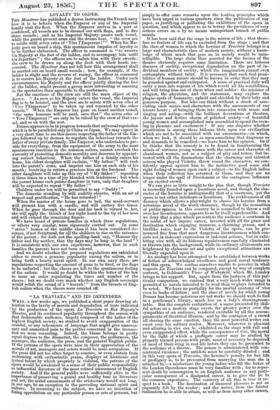LOYALTY TO ORDER.
THE Moniteur has published a decree instructing the French navy how it is to behave when the Emperor or any of the Imperial family visit the fleet. When the Emperor arrives in a port or roadstead, all vessels are to be dressed out with flags, and to fire three rounds; and as his Imperial Majesty passes each vessel, while the guard present arms and the drums beat, " the crew are to 131'11AR with seven cries of 'Vive l'Empereur? ' " When his Ma- jesty goes on board a ship, this spontaneous impulse of loyalty. is to be further elaborated. The officer in command is " to receive his Majesty at the foot of the ladder, and to accompany him until his departure " ; the officers are to ;elute him with their swords ; the crew to be drawn up along the deck with their heads un- covered. The Moniteur does not tell how this arrangement shall be carried out on board small vessels ; how, for example, if the ladder is slight and the reverse of roomy, the officer in command is to receive his Majesty at the foot of the ladder. Under such circumstances, his Majesty and the officer jointly sharing the foot of the ladder, might present a group more interesting or amusing to the spectators than agreeable to the performers. But the emotions of the crew are still the main object of the decree. " As soon as his Majesty enters the vessel, the Imperial flag is to be hoisted, and the crew are to salute with seven cries of Vive l'Empereur I.' to be taken up and repeated by the other vessels." When the Emperor has gone on board another vessel, "the same honours will be paid, save that" the seven cries of ,4 Vivo l'Empereur !" are only to be raised by the crew of that ves- sel, and so on with the rest.
France appears to be in progress towards that universal regulation which is to be paralleled only in China or Japan. We may expect in a very short time to see this decree respecting the father of the Em-
pire followed up by decrees to regulate the behaviour towards the father of every private family. The Emperor, who undertakes to pro- vide for everything, from the equipment of the army to the most spontaneous emotions in the common sailors, cannot overlook the necessity of protecting domestic morality and decorum by appoint- ing correct behaviour. When the father of a family enters his home, his eldest daughter will exclaim, " My father! " will rush into the parent's arms, and imprint one kiss on each side of his mouth ; receiving in return a gracious kiss on the forehead. The other daughters will take up this cry of " My father !" repeating it three times in a tone of joy blended with tenderness; but when the parent kisses each puisne daughter in turn, only that daughter will be expected to repeat " My father ! "
Children under ten will be permitted to say " Daddy ! " The domestic standing by will audibly observe, with an air of
resVand gratification, " He has returned ! "
en the master of the house goes to bed, the maid-servant will present him with a candle, and will curtsey five times. When he goes through the door and his back is turned to her, she will apply the thumb of her right hand to the tip of her nose and will extend the remaining fingers. We have heard of private families in which these regulations, or others very similar, were rigorously carried out. In some " strict " homes of the middle class it has been considered de- corous, if not Scriptural, for all the children to rise on the entrance of the parent ; for doth not the spelling-book say, " Honour thy father and thy mother, that thy days may be long in the land " P It is consistent with our own experience, however, that in such families the parents have not been adored. And we doubt whether the proposed regulations are calculated either to create a genuine popularity among the sailors, or to b ing forth a hearty naval spirit. In our own navy there are regulations respecting the amount of guns to be fired, or the flags to be unfurled ; but the cheers are left to the spontaneous feeling of the sailors. It would no doubt be within the letter of the law to issue an order regulating the times and number of the cheers ; but we doubt very much whether any English sovereign would relish the sound of a " hurrah ! " from the breasts of Eng- lish sailors when the cheers were counted off.


























 Previous page
Previous page